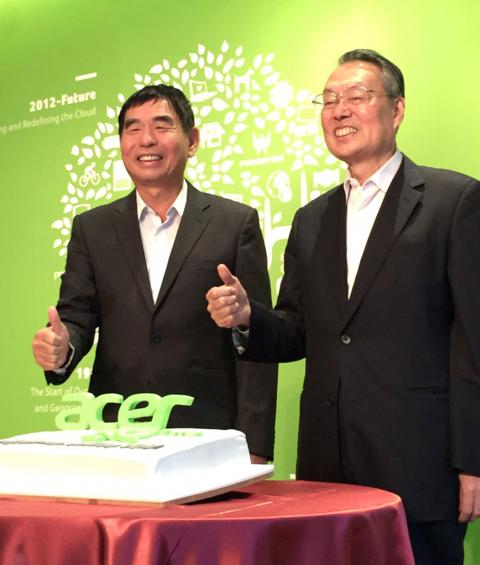Acer Inc (宏碁) celebrated its 40th anniversary yesterday, with founder and former chairman Stan Shih (施振榮) urging high-ranking executives to purchase company shares.
“We want to create a corporate culture in which ranking officials would treat the company as their own, so they would care more about the company and not consider themselves as just a ‘salary earner,’” Shih said.
Shih said he had shared the idea with chief executive officer Jason Chen (陳俊聖) before Chen took the position in 2014.

Photo: CNA
Chen bought more than 2.55 million shares, or a 0.08 percent stake, in Acer from 2014 to last year, according to the company’s annual report published in June.
Shih said that he and Acer chairman George Huang (黃少華) both support Chen becoming Acer’s new chairman next year.
“Chen has a very strong bond with and commitment to Acer,” Shih said.
Companies nowadays use the so-called “golden parachute” policy to protect an executive’s interests in the event of contract termination, but Shih said he thinks only when an executive owns a stake in the company will they feel responsible and operate from a long-term development perspective rather than with a shortsighted view.
Shih said Acer does not rule out the possibility of seeking a foreign chief executive officer again, but the candidate must see the company as his own and agree with the core beliefs of Acer’s wangdao (王道) philosophy — which means sustainable development, value creation and balanced interests, he said.
Shih said that his eldest son, Maverick (施宣輝) — who is expected to start leading Acer’s Build Your Own Cloud business and smart devices business next month — might not become a board member any time soon, as he offers limited added-value to the company’s operations at the moment.

Taiwan Semiconductor Manufacturing Co (TSMC, 台積電) secured a record 70.2 percent share of the global foundry business in the second quarter, up from 67.6 percent the previous quarter, and continued widening its lead over second-placed Samsung Electronics Co, TrendForce Corp (集邦科技) said on Monday. TSMC posted US$30.24 billion in sales in the April-to-June period, up 18.5 percent from the previous quarter, driven by major smartphone customers entering their ramp-up cycle and robust demand for artificial intelligence chips, laptops and PCs, which boosted wafer shipments and average selling prices, TrendForce said in a report. Samsung’s sales also grew in the second quarter, up

On Tuesday, US President Donald Trump weighed in on a pressing national issue: The rebranding of a restaurant chain. Last week, Cracker Barrel, a Tennessee company whose nationwide locations lean heavily on a cozy, old-timey aesthetic — “rocking chairs on the porch, a warm fire in the hearth, peg games on the table” — announced it was updating its logo. Uncle Herschel, the man who once appeared next to the letters with a barrel, was gone. It sparked ire on the right, with Donald Trump Jr leading a charge against the rebranding: “WTF is wrong with Cracker Barrel?!” Later, Trump Sr weighed

LIMITED IMPACT: Investor confidence was likely sustained by its relatively small exposure to the Chinese market, as only less advanced chips are made in Nanjing Taiwan Semiconductor Manufacturing Co (TSMC, 台積電) saw its stock price close steady yesterday in a sign that the loss of the validated end user (VEU) status for its Nanjing, China, fab should have a mild impact on the world’s biggest contract chipmaker financially and technologically. Media reports about the waiver loss sent TSMC down 1.29 percent during the early trading session yesterday, but the stock soon regained strength and ended at NT$1,160, unchanged from Tuesday. Investors’ confidence in TSMC was likely built on its relatively small exposure to the Chinese market, as Chinese customers contributed about 9 percent to TSMC’s revenue last

LOOPHOLES: The move is to end a break that was aiding foreign producers without any similar benefit for US manufacturers, the US Department of Commerce said US President Donald Trump’s administration would make it harder for Samsung Electronics Co and SK Hynix Inc to ship critical equipment to their chipmaking operations in China, dealing a potential blow to the companies’ production in the world’s largest semiconductor market. The US Department of Commerce in a notice published on Friday said that it was revoking waivers for Samsung and SK Hynix to use US technologies in their Chinese operations. The companies had been operating in China under regulations that allow them to import chipmaking equipment without applying for a new license each time. The move would revise what is known